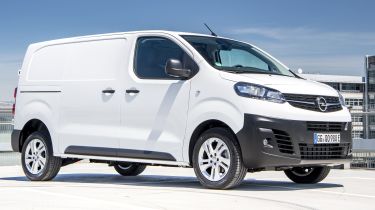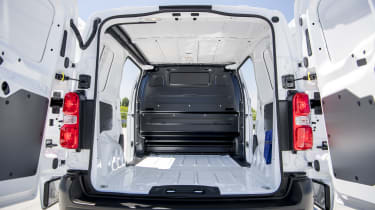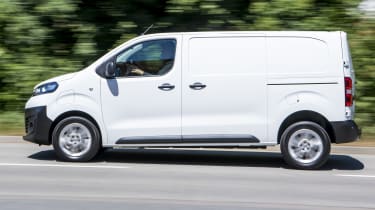Vauxhall Vivaro-e Hydrogen review
The Vivaro-e Hydrogen offers the ideal combination of zero greenhouse gas emissions and a good range, but it’s held back by the UK’s lack of hydrogen filling stations

Pros
- Comfortable
- Cargo space
- Quick to fill up
Cons
- Few hydrogen filling stations
- 15 seconds to get up to 62mph
- No load-through bulkhead
| Van type | Driving range | CO2 emissions | 0-62mph |
|---|---|---|---|
| Hydrogen | 250 miles | 0g/km | 15s |
Considering the majority of electric vans can’t cover close to 200 miles before requiring a lengthy charging session, they’re not the best work vehicles for tradespeople and delivery drivers who are on the road all day long. Vauxhall’s solution to this issue isn’t bigger batteries, but the addition of a hydrogen fuel-cell.
Until now this technology has been reserved for a very limited number of cars, namely the Toyota Mirai saloon. But more hydrogen fuel-cell vehicles, or FCEVs, are on the horizon, and even the Stellantis Group, which owns Vauxhall, is planning to introduce a new line-up of hydrogen-powered vans.
Let’s get all the technical bits out the way first. At the moment, FCEV models such as the Vivaro-e Hydrogen and its Citroen and Peugeot sister models are made by taking completed electric vans off their production line in France and sending them to Opel’s Special Vehicles division in Germany. Here, the vans have some of their running gear replaced with the hydrogen tech.
It begins with the Vivaro-e’s battery beneath the cargo floor being swapped for three tanks in a steel cage, capable of carrying 4.4kg of hydrogen. The electric motor under the bonnet is paired with a fuel cell stack which turns the stored hydrogen into electrical energy. Finally, a 10.5kWh lithium-ion battery pack (sourced from Stellantis's plug-in hybrid models, such as the Citroen C5 Aircross) is added beneath the seats.
You get the same 134bhp and 260Nm of torque electric motor as the regular Vivaro-e, which sends all its power to the front wheels, and results in a roughly 15 second 0-62mph time for the hydrogen-powered van. Thankfully, the van's carrying capacity isn't affected by the conversion, with a cargo volume of 5.3 cubic metres for the standard model and 6.1 cubic metres for the longer-bodied van. You can’t get a load-through bulkhead with the Hydrogen model, but payloads and towing weights are both one tonne at least.
The Vivaro-e Hydrogen can cover around 250 miles thanks to the combination of fuel cell and battery, which is more than the pure-electric version offers. The battery alone can actually deliver roughly 31 miles of range, so you're not entirely stuck if you run out of hydrogen. But, more importantly, it takes just three minutes to refill the hydrogen tanks and be on your way, compared to the several hours you need to keep the EV version plugged in to fully replenish its battery.
On the road, the Vivaro-e Hydrogen drives largely like the fully electric model. There's a bit more noise from the fuel cell as it converts the hydrogen into electricity, but it's by no means loud nor does it impede on cruising comfort. Plus, the sound isn’t connected to your speed, so it doesn't get any louder the faster you go. We have no doubt there’s enough performance on tap for everyday duties, and the van is responsive off the line, but performance tails off as you approach the 68mph top speed.
Again, like the battery-powered Vivaro-e, the hydrogen model is smoother than the diesel model and overall is more car-like to drive than some of the other medium-sized vans on the market. The cabin is also identical to the rest of the range, aside from the two smaller dials in the instrument cluster, which now show how much hydrogen is left in the tanks and battery capacity. The only real difference is the rear of the Vivaro-e Hydrogen’s sits slightly higher than the fully electric version, probably because there’s less weight over the rear wheels with the EV’s battery gone.
In isolation, the Vauxhall Vivaro-e Hydrogen presents a genuine solution to the issue of range anxiety for those drivers or business who before now were afraid to make the switch from diesel to electric power. It offers an equally comfortable and stress-free driving experience, with zero change in cargo space, and you can be back on the road in fewer than five minutes thanks to the hydrogen fuel cell. However, the UK is going to need a lot more than the 10 hydrogen filling stations that are currently in operation before most drivers are likely to consider buying one.


